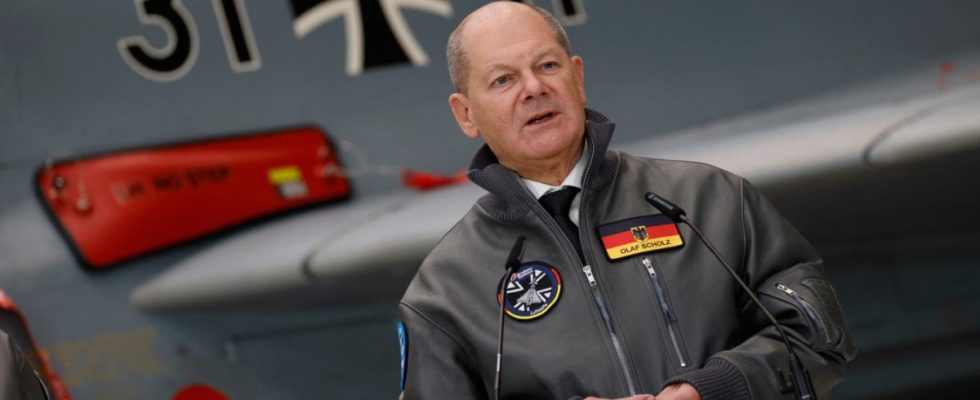It’s pretty loud at Airbus in Manching, Bavaria. A good 25 honking tractors have lined up in front of the entrance to the factory premises and are holding banners calling for an end to the traffic light coalition or at least less burden on their profession. Every now and then there are bangs and rumbles in the gray winter sky, but not because the gods are angry with the traffic lights, but because presumably one of them Eurofighter or another of the aircraft that are manufactured and maintained here near Ingolstadt really tests its engines.
When asked, the protesting farmers aren’t even concerned about Airbus Eurofighter or the federal government’s announced export of up to 48 of these machines to Saudi Arabia – none of this seems to matter to them. They are simply fundamentally against the traffic lights and their policies.
Chancellor Olaf Scholz, who is making a stopover at Airbus on the way to the memorial service for the late football legend Franz Beckenbauer in Munich, is here because of the fighter jets, not because of his government’s agricultural policy. The likely export of the war machines has led to the fact that, in addition to the criticism of the traffic lights, there is now also criticism from the traffic lights.
The Greens’ stomach ache
The Green coalition partner in particular had difficulty with the Chancellor’s decision. Anton Hofreiter criticized the sale to the “Dictatorship of Saudi Arabia” when Germany was simultaneously supplying Taurus-I refuse to send cruise missiles to Ukraine, which is being attacked by Russia. Sara Nanni, defense policy spokeswoman for the Green Party, warned that we have to ask ourselves what will happen to such aircraft “in 5 or 15 years.”
Saudi Arabian warplanes are currently helping to intercept rockets launched at Israel by the Houthi militias from Yemen. Such geostrategic factors now also play a role in armaments decisions, especially in view of the turning point that has so far only been announced.
Wearing a new gray flight jacket that the Airbus employees had given him, Scholz then posed one in front of the backdrop Eurofighter the context in which arms projects currently need to be discussed in Germany: “The Russian war of aggression on Ukraine has made it clear to us again: We need a strong defense industry and also a strong Bundeswehr, a strong NATO alliance, so that we can “We can ensure that peace and security in Europe are maintained.”
Defense industry is waiting for further orders
The Chancellor’s visit to Airbus, which was actually planned for December and was then postponed due to the budget crisis, is apparently intended to demonstrate the will to strengthen the German and European defense industry in several respects. So far, 58 will be produced by 2030 Eurofighter-Jets planned – 38 for the Bundeswehr, 20 for Spain. What will happen next with the model is not yet entirely clear.
The defense industry is currently waiting for orders for further development of the Eurofighter, the so-called 5th tranche. According to Airbus, the decision on this must be made during this legislative period in order to ensure supply chains. Scholz said nothing about this in Manching. However, he emphasized how important the aircraft were, whose production and maintenance he had shown here.
Scholz has the production of the individual components of the “Eurofighter” explained to him in Manching.
(Photo: Johannes Simon/Getty Images)
Without new ones Eurofighterorders could potentially create a gap in the production of European air combat systems. The “Future Combat Air System” (FCAS), which will consist of a new aircraft and several escort drones and is also being developed by Airbus, among others, will not be ready for use before 2040. Again Eurofighter – which is produced by Germany, Spain, Italy and Great Britain – FCAS is also a European project with German, French and Spanish participation. “This is also about the future of how we want to advance this together in Europe,” said Scholz about the importance of these collaborations.
Currently the French one Rafale-Jet is a competitor to the export market Eurofighter. This was also a factor in the decision to export to Saudi Arabia.
At the end the Chancellor said in the Eurofighter-Production hall then added: “This was a very important visit for me, which leaves me very confident that we will be able to tackle the tasks we face together.” What exactly these tasks look like has not become entirely clear. In any case, the turning point still seems as if it is only just emerging on the horizon. After all, the farmers and their tractors left peacefully at the end of the Chancellor’s visit.

